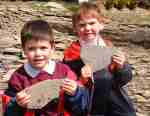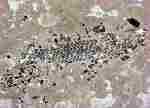|
Move to Halt Fossil Theft and Damage in Scotland
 An event to promote the protection
of one of Scotland’s oldest and rarest resources took place in
Caithness to highlight the ongoing problem of illegal fossil collecting.
On May 23rd, there was a ‘fossil foray’ at Skinnet Farm quarry,
involving local primary school children, fossil collectors and rangers, to
demonstrate good practice in gathering fossils, followed by a briefing on
the subject. The event was organised by Scottish Natural Heritage (SNH),
and includes local police wildlife liaison officers and a fossil expert
from the Hunterian Museum in Glasgow. It was
organised as part of the Partnership for Action Against Wildlife crime
(PAW), which seeks to raise awareness on wildlife crime and to enforce
wildlife conservation legislation in Britain. Partnership for Action
Against Wildlife crime (PAW) is a multi-agency body including all
organisations involved in wildlife law enforcement in the UK. Its main
objective is to promote the enforcement of wildlife conservation
legislation, particularly through supporting the networks of Police
Wildlife Liaison Officers. An event to promote the protection
of one of Scotland’s oldest and rarest resources took place in
Caithness to highlight the ongoing problem of illegal fossil collecting.
On May 23rd, there was a ‘fossil foray’ at Skinnet Farm quarry,
involving local primary school children, fossil collectors and rangers, to
demonstrate good practice in gathering fossils, followed by a briefing on
the subject. The event was organised by Scottish Natural Heritage (SNH),
and includes local police wildlife liaison officers and a fossil expert
from the Hunterian Museum in Glasgow. It was
organised as part of the Partnership for Action Against Wildlife crime
(PAW), which seeks to raise awareness on wildlife crime and to enforce
wildlife conservation legislation in Britain. Partnership for Action
Against Wildlife crime (PAW) is a multi-agency body including all
organisations involved in wildlife law enforcement in the UK. Its main
objective is to promote the enforcement of wildlife conservation
legislation, particularly through supporting the networks of Police
Wildlife Liaison Officers.
 Scotland boasts some of the rarest
and most scientifically important fossils in the world, spanning at least
800 million years of Earth history. These range from some of the earliest
land plants and fish fossils to early mammal and dinosaur remains. Yet
this priceless natural heritage is threatened by the irresponsible and
illegal collecting and trade of rare fossils, some of which can be sold on
the international market for thousands of pounds. Scotland boasts some of the rarest
and most scientifically important fossils in the world, spanning at least
800 million years of Earth history. These range from some of the earliest
land plants and fish fossils to early mammal and dinosaur remains. Yet
this priceless natural heritage is threatened by the irresponsible and
illegal collecting and trade of rare fossils, some of which can be sold on
the international market for thousands of pounds.
Fossil collecting is not illegal if
permission is obtained from the landowner. There is no desire whatsoever
for a blanket ban of such small-scale responsible collecting, as it is a
hobby enjoyed by many people, including children and amateurs, some of
whom have made remarkable new discoveries. The problem lies with those who
collect irresponsibly and without permission. Such collectors do not
report their findings, and can destroy rock faces in their attempts to
pick off the rarest and most valuable samples.
People collecting for financial
gain have already damaged sites in Caithness, Orkney, Skye, Lanarkshire
and Ayrshire through large-scale removal of fossils, using rock saws and
other industrial-scale machinery. In 1992, for example, a collector used a
JCB to dig up a fossil bearing rock from ‘Cheese Bay’, near North Berwick
and an entire fossil-bearing ‘fish bed’ in Orkney has recently been
removed by collectors. The fossil-bearing rocks at the Birk Knowes Site of
Special Scientific Interest in Lanarkshire have almost been totally
‘worked out’ as a result of a German fossil collector, who had no permit
to excavate the very rare and valuable fossils. Despite negotiations
by SNH with the Humboldt museum in Germany, which now holds the specimens,
no agreement has yet been reached on giving back the rarest and most
important fossils from the site.
Dr Colin MacFadyen, SNH Geologist
said:
“Scotland is seen as a ‘soft spot’ for
collectors and currently continental European and British collectors can
thieve with impunity. If there is inaction to legislate for the curbing of
irresponsible theft from and damage to Scotland’s vulnerable sites, we may
as well hang up a big sign at the Scottish Border or at Dover saying
‘Scotland open for fossil collecting, hurry while stocks last.’ Until we
have the necessary safeguard, I would urge owners of fossil localities to
watch out for rock saw-yielding irresponsible collectors.”
Part of the problem of illegal
fossil collection is that many of the sites are in remote locations so the
thefts are only detected after the collectors have gone. In addition, many
landowners are unaware of the scientific value of the fossils on their
land or do not regard irresponsible collecting as a problem. As a result
noone reports the crime to the police.
Inspector John Grierson, the force
wildlife liaison officer at the Northern Constabulary said:
“We urgently need people to come forward and report any fossil gathering
which they suspect may be carried out without permission. We are losing
some of our most prized geological resources to wildlife thieves, who have
no regard for protecting this important part of our natural heritage.” |

